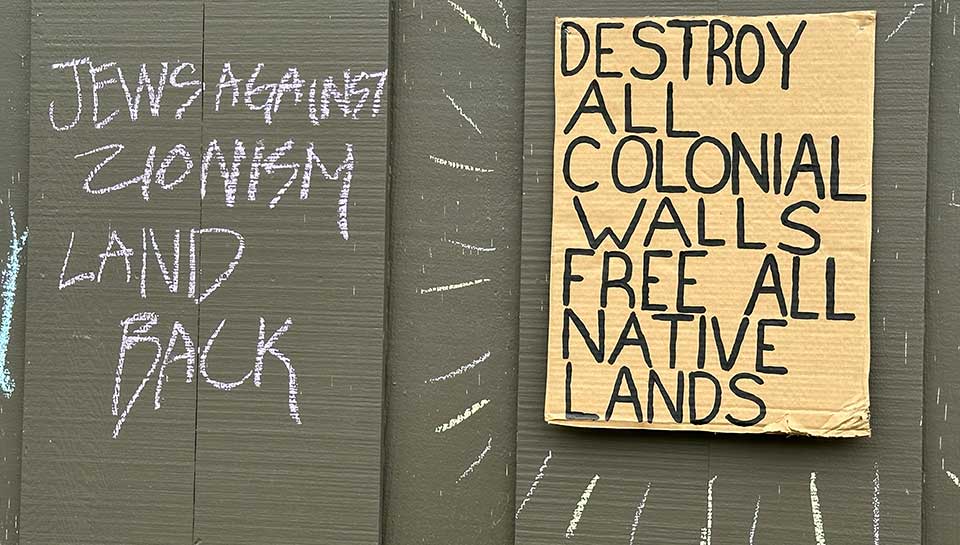
ARCATA, Calif. – The university administration had shut down the campus of California Polytechnic University Humboldt—commonly known as Cal Poly Humboldt— and urged the students to vacate the campus, but the student who welcomed me on Thursday had a warm smile and the words, “We love Palestine and we love Jewish folk.”
That multi-faith and multicultural welcome epitomized the spirit of hundreds of students on campus who had been camping out to protest what they consider is the university’s complicity in the mass slaughter of civilians perpetrated by the Israeli military in Gaza. Tents dotted the campus, defying the administration’s demand to empty the campus, and signs affirming solidarity with Palestine dotted lawns and walkways.
The wave of student protests against the Israeli war on Gaza hit Cal Poly—located in Arcata, a rural town of about 15,000 in northern California— Monday, April 22, when hundreds of students occupied and blockaded Siemens Hall, a campus administration building, demanding that the university divest from Israel, suspend collaboration with Israeli universities, and call for a cease-fire in Gaza.
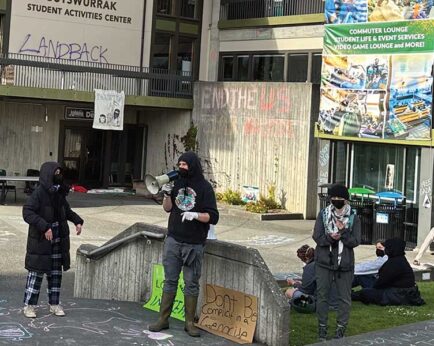
Explaining the protester intent, Ryan Connelly, a junior biology major who acted as spokesperson for the demonstrators, reported, “The message from inside is that, first of all, they feel the university is complicit because of investments with weapons companies and Israeli companies. Their conditions for release of the building: Divest, and then we’ll talk.”
Rather than talk with students, the administration called in the police to force them to vacate Siemens Hall. Dave Meserve, a longtime community activist and former Arcata city councilperson, observed: “There were at least 30 cops, maybe more, and a helicopter circling overhead and it just seemed like way excessive, the response to what was going on,” he said, adding that he urged police to stand down and protesters to begin negotiations with the university.
Three people were arrested, but the police did withdraw. In response to the occupation of the one building, the university administration shut down the entire campus, declaring that henceforth all classes would be offered remotely and that staff would likewise work remotely.
Protester Holly Hiatt told The Times-Standard that the original plan of the sit-in at Siemens Hall was never to close campus. “The university is pinning that on the protest even though it was their decision,” Hiatt said. “That was never requested by anyone.”
Remained on campus
Nevertheless, the students stayed on campus, organizing teach-ins and other activities proclaiming their solidarity with Palestine and their demands that the university cease complicity with the assault on Gaza. Thus, the occupation of Siemens Hall became an occupation of the entire campus.
University faculty came onto the closed-down campus to express their solidarity with the students. On Thursday, the executive board of the Cal Poly Humboldt chapter of the California Faculty Association passed a vote of no-confidence in university president, Tom Jackson, and his chief of staff, Mark Johnson, citing dissatisfaction with their handling of the protests. The university senate passed a resolution for a permanent ceasefire in Gaza.
Students and community members showed their support by bringing food, cooking oatmeal, and making French toast and coffee and by posting protest signs and flags throughout the campus.
Some have complained that student protests against the Israeli war on Gaza are anti-Semitic or at least tolerate expressions of anti-Semitism. That certainly did not seem to be the case here at Humboldt.
When one of the students was asked about these allegations, she responded that the protest community was “the most beautiful multicultural place,” and a number of facts confirmed her contention. A local rabbi led a Jewish shabbat service Friday that drew around 100 participants. Muslim prayers were also held, and symbols and images belonging to a variety of religions and traditions were scattered throughout the occupied campus.
Interviews with a number of demonstrators showed their deep moral commitment. One student who identified herself as “Trillium,” when asked what motivated her to join the protest, said, “My values. I saw that something needed to happen and that I would be guilty of I didn’t take part.”
Another, responding to the same question, declared, “Since I was a child, I have seen how the fossil fuel industry is ruining our world. I see it connected to Western imperialism and colonialism, and with the images of killing that I see on my phone every day.”
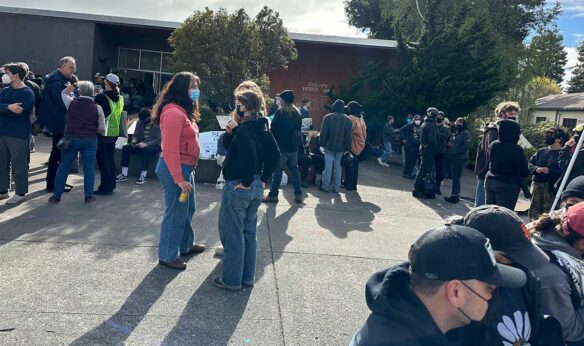 On Thursday, the university administration responded to the student demands, stating through its environmentally and socially responsible investment policies, the university’s endowment investments do not include direct investments in defense companies, Israeli securities, or firms associated with defense, and that Cal Poly Humboldt has no current ties with Israeli universities.
On Thursday, the university administration responded to the student demands, stating through its environmentally and socially responsible investment policies, the university’s endowment investments do not include direct investments in defense companies, Israeli securities, or firms associated with defense, and that Cal Poly Humboldt has no current ties with Israeli universities.
Students noted, however, that the university and the California state university system of which it is a part did have in its portfolio entities that did business with Israeli firms and that the university had a joint program with a university in Haifa, Israel, although no Cal Poly student was currently enrolled in it.
Saturday afternoon, the university announced a “hard closure” of campus via a news release stating that because of the ongoing protest and occupation, people who do not live on campus are now prohibited from being present on campus and will be subject to arrest if they are found there. However, Humboldt County Sherriff William Honsal seemed to strike a different note, saying when asked if deputies will appear on campus before further talks with the protestors, “There’s no sense of urgency at this point in time. Unless there’s a reason to go in there right now because of something that’s occurring beyond those lines, we have no plans at this moment to go in there.”
On Sunday, the Cal Poly administration issued a statement that denounced the protest as “lawless behavior that has harmed the majority of our students”—ignoring the fact that, as noted, it was the university and not the students who closed the campus. The statement estimated the damage from the protest as being “in the millions.”
Students whom this reporter spoke to rejected this assertion, and it in fact contradicted the finding of Jeff Crane, Dean of the College of Arts. Humanities, and Social Scientists, who inspected Siemens Hall and found only minimal damage. A protester who identified herself as Rosie summarized the standoff: “Personally, I think that they don’t want students to recognize how much power they have.”




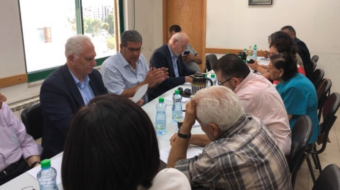
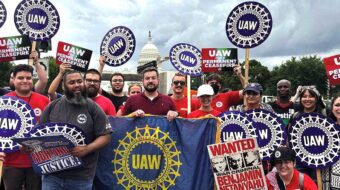






Comments